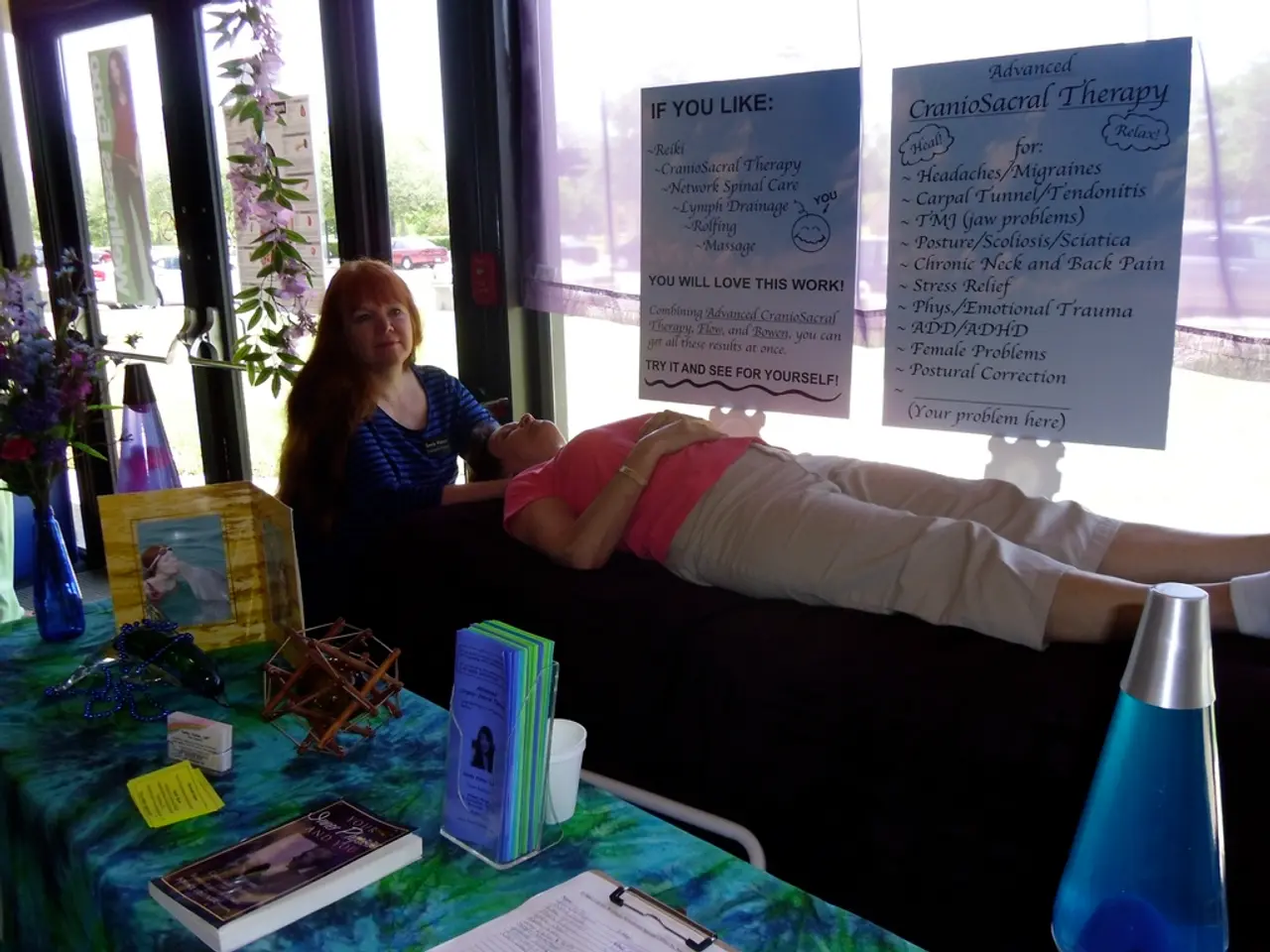Differentiating Anxiety and Depression: Crucial Distinctions and Successful Treatments
Anxiety and depression are two distinct yet interconnected mental health conditions that can significantly impact a person's life. While they share some similarities, each condition has its unique characteristics, symptoms, causes, and treatment approaches.
Symptoms
Anxiety primarily involves excessive worry or fear about everyday situations, physical symptoms of heightened arousal such as rapid heartbeat, sweating, shaking, gastrointestinal upset, restlessness, irritability, difficulty relaxing, and panic attacks. People with anxiety often feel constantly "on edge" or afraid of future threats.
On the other hand, depression is marked by persistent sadness, feelings of hopelessness and worthlessness, loss of interest or pleasure in previously enjoyed activities (anhedonia), changes in appetite and sleep, psychomotor changes (either agitation or slowing), fatigue, and cognitive difficulties such as poor concentration. It is often described as a state of emptiness or loneliness.
Causes
Anxiety may arise from a combination of genetic factors, brain chemistry imbalances (such as serotonin and norepinephrine), personality traits, and environmental triggers such as stress or trauma.
Depression, while sharing some overlapping factors like genetics and brain chemistry, often follows or co-occurs with anxiety disorders. Depression involves diminished positive emotional experience, which differs from anxiety’s heightened physiological arousal.
Treatment Strategies
Anxiety treatments typically include medications (such as benzodiazepines to calm anxiety and beta-blockers for physical symptoms), psychotherapy approaches like Cognitive Behavioral Therapy (CBT) or Dialectical Behavioral Therapy (DBT), counseling, and mindfulness techniques. CBT is structured and focused on changing negative thought patterns but may require 12 to 20 weeks to be effective.
Depression treatments often include antidepressant medications that balance neurotransmitters, psychotherapy (including CBT and other approaches), and lifestyle changes. Since depression involves lack of pleasure and motivation, treatment also focuses on restoring these functions.
Summary Table
| Aspect | Anxiety | Depression | |----------------|--------------------------------|---------------------------------| | Core Symptoms | Excessive worry, restlessness, physical hyperarousal | Persistent sadness, anhedonia, hopelessness | | Physical Symptoms | Fast heartbeat, sweating, shaking, GI upset | Psychomotor changes, fatigue, appetite/sleep changes | | Emotional Experience | Fear, nervousness, irritability, tension | Emptiness, loneliness, worthlessness | | Causes | Genetic, brain chemistry, personality, stress | Genetic, brain chemistry, often follows anxiety | | Treatment | Medications (benzodiazepines, beta-blockers), CBT, DBT, mindfulness | Antidepressants, psychotherapy (CBT), lifestyle changes |
Both conditions are serious but treatable, and a proper psychiatric evaluation is recommended to tailor interventions to the individual’s symptoms. Importantly, many people can suffer from both conditions simultaneously, necessitating integrated treatment approaches.
Common stressors that can lead to the development of anxiety and depression include work-related stress, relationship problems, and financial difficulties. However, it's essential to remember that seeking help is a sign of strength, not weakness.
In supporting someone struggling with anxiety or depression, being a non-judgmental listener, encouraging professional help, participating in health-focused activities, showing understanding, and performing regular check-ins can make a significant difference. Regular exercise, a healthy diet, adequate sleep, and stress management techniques can also help manage symptoms.
Natural remedies for anxiety and depression include moderate physical exercise, a nourishing diet rich in omega-3 fatty acids, vitamins, and minerals, and avoiding extreme caffeine consumption.
Remember, it's crucial to approach mental health issues with empathy, understanding, and a willingness to learn. If you or someone you know is struggling, reach out to a healthcare professional for guidance and support.
[1] American Psychiatric Association. (2013). Diagnostic and Statistical Manual of Mental Disorders (5th ed.). Arlington, VA: American Psychiatric Publishing. [2] National Institute of Mental Health. (2021). Anxiety Disorders. Retrieved from https://www.nimh.nih.gov/health/topics/anxiety-disorders/index.shtml [3] National Institute of Mental Health. (2021). Depression. Retrieved from https://www.nimh.nih.gov/health/topics/depression/index.shtml [4] Mayo Clinic. (2021). Anxiety disorders. Retrieved from https://www.mayoclinic.org/diseases-conditions/anxiety/symptoms-causes/syc-20373465 [5] Mayo Clinic. (2021). Depression. Retrieved from https://www.mayoclinic.org/diseases-conditions/depression/symptoms-causes/syc-20356864
- Yoga and meditation, known for their stress-reduction benefits, can be valuable additions to the treatment strategies for both anxiety and depression.
- A workplace-wellness program that includes mental health initiatives, such as yoga classes and meditation sessions, may help employees manage symptoms of anxiety and depression.
- Incorporating a balanced diet rich in lean proteins, fruits, vegetables, and whole grains, as well as omega-3 fatty acids for their anti-inflammatory properties, can contribute to overall mental health and recovery from anxiety and depression.
- During training for a running event, incorporating mindfulness exercises and regular stretching routines can enhance mental and physical well-being while reducing the risk of developing anxiety or depression.
- Strengthening the muscle-mind connection through exercises that require focus, such as pilates or bodyweight training, may help individuals build resilience and motivation in managing their mental health conditions.
- Engaging in regular exercise and following a nutrient-dense diet can contribute to improved skin health, which in turn may boost overall mental health and sense of self-worth, mitigating symptoms of anxiety and depression.
- In exploring various mental health treatment options, one may find that science-backed fitness and exercise programs, such as High-Intensity Interval Training (HIIT) or Power Yoga, have proven benefits for mental health recovery and strength-building.
- It can be beneficial to consult with a healthcare professional about the potential inclusion of natural remedies, such as herbal supplements or essential oils, within a comprehensive treatment plan for managing anxiety and depression.
- Employers should prioritize mental health and wellness initiatives in the workplace, acknowledging the link between mental health and productivity, and thereby promote a healthier, more motivated workforce.
- To maintain mental health and promote ongoing recovery from anxiety and depression, one must commit to regular self-care practices that include exercise, a balanced diet, stress management techniques, and participation in mental health support groups or therapy sessions.




